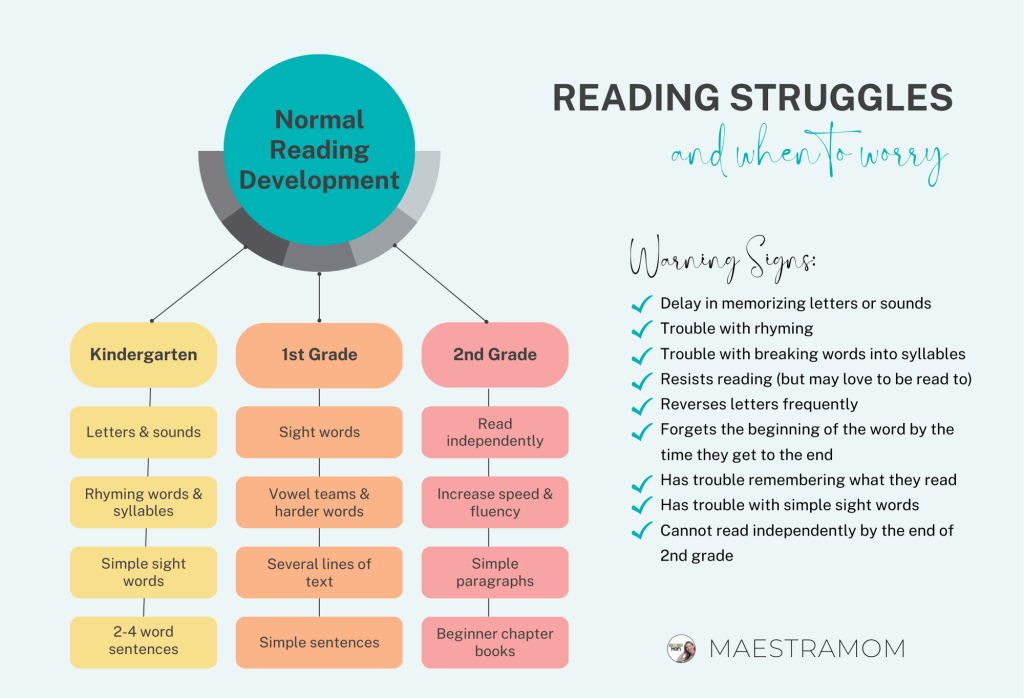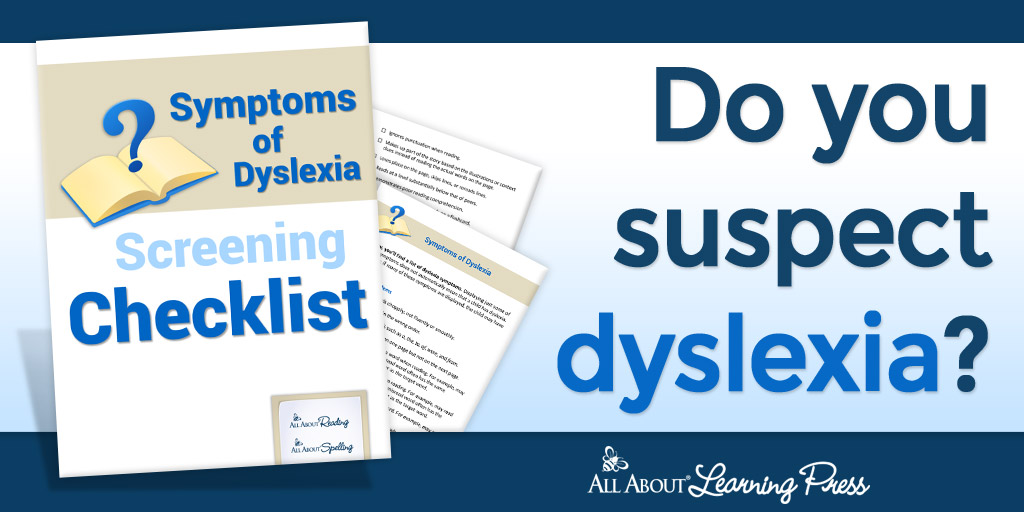So you’re listening to her struggle to read with a smile plastered on your face, nodding and encouraging while she painfully sounds out each small single sound. By the end of the word, though, she has no idea what word she just said. She even stumbled over the sight words you just practiced. You sigh, force another smile, and wonder, “should reading be this hard?”
As moms, we know that one of the biggest goals of early elementary school is to learn how to read and it tears up our hearts when reading struggles become a daily foe for our kids. So, what is normal in the journey to learning to read? When should a mom start to worry? When is it time to reach out for help? As a homeschool mom, it can be especially difficult to know when to take reading struggles seriously.
The truth is that reading is challenging for many students and takes a long time to completely master. In fact, just like learning to speak, learning to read fluently usually takes several years. Most children learn their ABCs and letter sounds in pre-school or kindergarten, then go on to really get the hang of reading in 1st grade. Some children continue to sound out words in the beginning of 2nd grade as well.
Reading Struggles vs. Normal Reading Development
Reading in Kindergarten
Don’t expect your kindergartener to be a strong, independent reader. Although some kindergarteners begin to read easily, it is not expected or necessary, so don’t worry if your child is not reading in kindergarten. What should they learn in kindergarten? Pre-reading and beginning reading skills.
First, your child should know the ABCs and letter sounds. Next, your child should be learning simple sight words like the, and, it, is. Already knowing letter sounds, kids will enjoy putting letters together to create simple consonant-vowel-consonant (CVC) words like “bed” or “hat”. They should be rhyming words and breaking words into syllables and beginning sounds. More than anything, children should be enjoying stories in books and become familiar with print and how words work.
What should a kindergartener be able to read?
In general, by the end of the school year, a kindergartener should be able to read a simple 2-4 word sentence, such as “I see a cat.” Most of the books at this level will be repetitive and picture supported so kids can predict what the words will say. In kindergarten, reading should definitely be fun and enjoyable!
Reading in First Grade
First grade is where the magic of reading usually happens! In first grade, words usually begin to make sense for most kids, and they decipher the pattern of how to read. This is when teachers begin to expose kids to harder words with long vowels and vowel teams like oo, ea, and ei as well as the famous silent e. Kids also focus on additional sight words while continuing to learn exceptions and harder word patterns. Now we’re reading not just words, but sentences.
What should a 1st grader be able to read?
By the end of first grade, a student should be able to read several simple sentences and beginner books such as those by Dr. Seuss or Elephant & Piggie books. This is the year where many kids transition from sounding out each word (decoding) to gradually reading more quickly and fluently.
If your child still has some reading struggles in first grade, though, it’s still not time to worry.
Reading in Second Grade
By second grade, reading struggles become easier for many children, but it is also typical that some kids still struggle with fluency (reading smoothly and quickly). In general, by 2nd grade, most readers begin to be able to handle longer sentences, multi-syllable words, and more text on a page. Perhaps most importantly, they begin to read more quickly and smoothly without having to stop to sound out each letter. Good-bye decoding! Hello, reading!
What should a 2nd grader be able to read?
A typical second grader is ready for beginning chapter books such as Amelia Bedelia or the Magic Treehouse series. These chapter books are still simple with pictures but may have from 60-100 pages which a child this age should be able to read independently. This is the year when some kids discover that reading is actually quite fun! They develop new interests and dive into more and more challenging books.
Some 2nd graders, though, are still decoding a bit – especially towards the beginning of the school year – so reading may still be slow and not very enjoyable yet. That’s normal, too, and not a cause for concern. It just means your reader needs more opportunities to read and a bit of extra support to make it fun. By the end of 2nd grade, a child should be well on their way to being a good reader.
>>> Read: Stop! Do You Know Your Kid’s Reading Level?

When to Worry about Reading Struggles
So, as a parent, when do you worry if your child struggles in reading? If your child cannot read independently by the end of 2nd grade, then you may want to seek out specialized assessment with a diagnostician. Other warning signs of a serious problem might include:
- Delay in memorizing letters or sounds
- Trouble with rhyming
- Trouble with breaking words into syllables
- Resists reading (but may love to be read to)
- Reverses letters frequently
- Forgets the beginning of the word by the time they get to the end
- Has trouble remembering what they read
- Has trouble with simple sight words
- Cannot read independently
If you see these reading struggles, it is possible your child could be dyslexic, have other reading challenges, or a learning disability.
>>> Read: Could it be Dyslexia? An Interview with a Dyslexia Therapist

What Do I Do if I Suspect a Reading Problem?
The best thing to do if you suspect a reading problem is to reach out to your local public school for a free Full Independent Evaluation (FIE). Even homeschooled students are entitled to a free evaluation through public schools! Any parent can request an evaluation. Just reach out by phone and then in writing to the public school your child would attend. While the process may take several months, it is an easy first step to make sure you are addressing the unique needs of your student.
Ask for a complete special education exam because it will give you the most comprehensive results to pinpoint where the problems are occurring. If fact, you will get back a ton of helpful information about how your child is progressing academically. When you fill out the paperwork, make sure you write down that you want your child screened for dyslexia, too.
Another quick thing you can do at home is administer what’s called a Running Record. It’s a simple, 10-minute evaluation of your child’s reading using any book on their grade level. It’s a helpful, fast way for a homeschool mom to know if their child is reading on-grade level.
>>> Jump to: Free Running Record form and how-to use it
Don’t Ignore Reading Struggles
It has been said that kindergarten, 1st, and 2nd grade is all about learning to read, while 3rd grade and on is about reading to learn. There’s some great truth in that statement! Reading is the key to a good education. It is such a foundational skill for life that it should never be overlooked or dismissed. There is no reason for any child to struggle in reading when help is readily available for free to all students!
Homeschooling can help a child catch up quickly if they are behind – especially once you know which specific skills you need to address. Just having the diagnostic info in hand will help you make informed decisions as your child’s parent and teacher. No more worrying!
Disclaimer: I am not a diagnostician and this article is not intended to replace the advice of specialists. If your child is struggling, consider locating an expert or specialist for an evaluation. I’m thrilled to be an affiliate for All about Learning Press, a leading resource for kids with dyslexia. So if you decide to visit their site, I’d be delighted if you would click my affiliate link. I only recommend products I use myself and love. Clicking to their website from my link costs nothing extra for you but helps keep my website free for the future.


